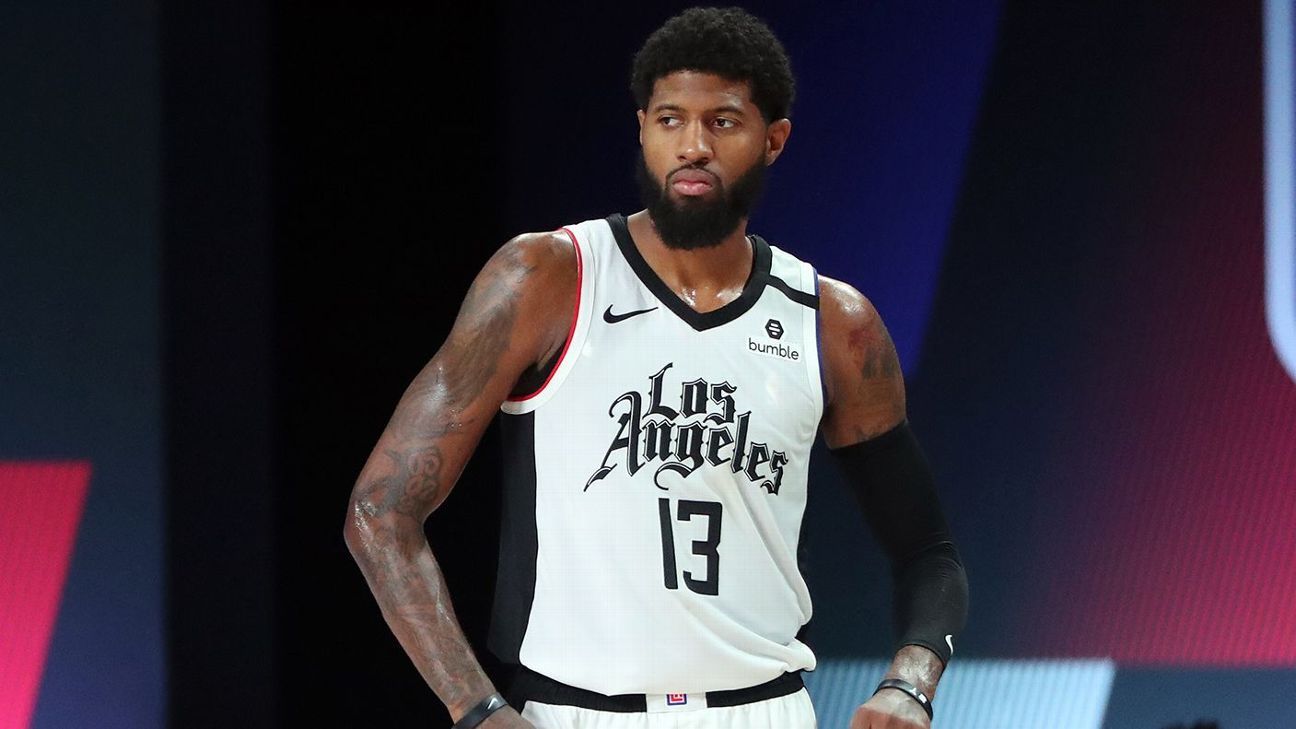After an emotional Wednesday meeting in which they left thinking the season could be over, the LA Clippers return to the court and play Game 6 on Sunday feeling closer than they were the last time they faced the Dallas Mavericks.
“Absolutely,” Clippers star Paul George said of the events of the past three days pulling the team closer together. “I mean, this is a roller coaster. It’s a roller coaster being in here, so all of us are riding this wave together, and it’s an experience we’ll all take away from it. But we definitely got closer.”
The Clippers and Los Angeles Lakers voted on perhaps not continuing with the postseason when polled during Wednesday night’s pivotal meeting between players and coaches, sources told ESPN’s Adrian Wojnarowski. As players considered what was best to do and how to continue their fight for social justice, they ultimately voted in favor of continuing the season on Thursday.
But during those tense hours in the aftermath of the Milwaukee Bucks opting not to play their Game 5 of their first-round series against the Orlando Magic which ignited a string of other postponed games over the shooting of Jacob Blake by Wisconsin police, the Clippers had several difficult conversations among themselves and with other teams.
“We had to spend two days of talking and having uncomfortable conversations,” George said. “You know, you got to see different guys’ points of view and different guys’ interests, and there was just a lot laid out on the table that the whole team kind of talked about. We definitely got closer.”
Since training camp last October, the Clippers have constantly been working on forming their chemistry amid numerous disruptions due to injuries, lack of practice time, two key roster additions in February, the four-month hiatus due to the coronavirus and then players arriving late or having to leave the bubble due to life circumstances. But after crushing the Mavericks 154-111 on Tuesday, the Clippers heard Doc Rivers deliver a gripping and emotional plea for social justice and equality in his postgame media session.
Rivers was furious after seeing video of Blake, a 29-year-old Black man, shot multiple times in the back by police as he tried to get into a car. Then the games came to a stop on Wednesday, leading to the players and coaches meeting in which Rivers was asked by Oklahoma City point guard and NBPA president Chris Paul to talk.
“I think every team is closer because of the last 48 hours,” Rivers said. “But I think what really is closer is just the players in general as a group … when you see guys in the room that are talking that probably don’t know each other … I mean, there’s some smart young players in this league. I can tell you that. I saw a player do a PowerPoint in front of the other players, and it was a lot of impressive stuff going on.”
Rivers and others have also said that mental health awareness was a topic of discussion during that meeting as well. George had revealed following Game 5 that he underestimated mental health and that he had been suffering from anxiety and some depression during a shooting slump he endured during Games 2, 3 and 4.
“You know, whether I was the first to say it [inside the bubble] or not, we’re all dealing with it,” George said of players feeling the effects of isolation inside the NBA’s bubble for 50 days and longer. “I’ve had conversations with guys here, and there’s been a couple guys that is like, man, I’m happy I’m not the only one. I’ve been dealing with this, too.
“It’s a thing in here. It’s a brotherhood.”
George said he sought help from a team psychiatrist, family, friends and his teammates. He hit 12 of 18 shots, including four of eight on 3-point attempts, to score 35 points in Game 5. In his previous three games, he said he felt like he was in a “dark place” while shooting 10-for-47 overall and missing 21 of 25 3-point attempts over Games 2, 3 and 4 combined.
“First, I wasn’t just going to cave in immediately,” George said of fighting through what he was feeling. “If it got severe, I think my team would have understood if I needed to walk away from this. But all it took was me seeking help and seeking advice, and starting from there, it helped. It put me in a different place.”
After learning of how difficult it has been inside the bubble for many players from Wednesday’s meeting, Rivers said that mental health needs to be treated more importantly than an injury.
“We’re starting to wake up to the reality that there’s no difference between a sprained ankle and something going wrong with your brain,” Rivers said. “The brain … it is more important. But it’s been such a taboo subject in society and probably even more taboo in sports because of the machismo.
“… Anything with the mind is [considered] weak, you know. That’s been the messaging throughout society… I just think we’ve just got to keep talking about it. The more we talk about it, the more we make it normal.”
